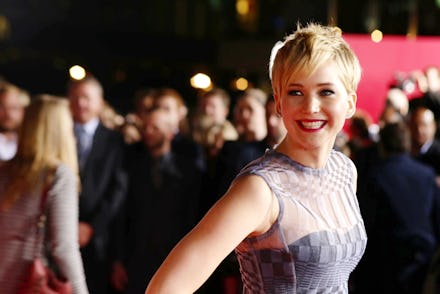Why We Expect More From Jennifer Lawrence Than Male Celebrities

With great celebrity comes great scorn, and Jennifer Lawrence might be on track to become the latest in a long line of female icons accused of being "fake." In a world that increasingly demands "authenticity," there is mounting pressure on female celebrities like Lawrence to prove that the down-to-Earth persona they display in public is an accurate reflection of who they really are.
Lawrence's newest film, American Hustle, is set to release in theaters on December 20. Reviews for the film have been stellar, and many praise Lawrence's performance in particular — as they have done for nearly every movie she's appeared in since Winter's Bone. With an Oscar win early this year for Silver Linings Playbook, the rousing success of Catching Fire, what looks to be a phenomenal mid-December film, and — as of Thursday morning — a Golden Globe nomination for Best Supporting Actress, 2013 is shaping up to be "The Year of Lawrence."
It's about this time that the naysayers rear their ugly heads. And so they have. As early as March of this year, entertainment commentators began pining to the ether about whether or not Jennifer Lawrence's laid-back, happy-go-lucky attitude is "real" or if she is just putting forth a relatable front for the camera.
And she's not alone. Last year, after her Supporting Actress Oscar win for Les Miserables, actress Anne Hathaway came under so much fire for being "annoyingly cheerful" that The New Yorker felt the need to defend her. Pretty much any female celebrity in the news today has undergone this same dissection of their public persona.
Madonna, who is so well established that questions about her authenticity are in books, has come into question often, with reviewers referring to her work as "antics" and "bizarre shenanigans." Miley Cyrus, whose laid back demeanor rivals J-Law's, is so often accused of faking her free-wheeling nature that her sister stepped up to defend her. The motivations behind Taylor Swift's personal life came under fire from fellow celebrity Kelly Osbourne, who said, "I cannot stand Taylor! She only dates people for press and is so hungry for attention."
Lady Gaga has taken heat for her unique image from women like Karen O to Camille Paglia, who referred to Gaga as a "manufactured personality." More than once, Nicki Minaj, whose image is similar to Gaga's, has been called a "Barbie'd, blinking, synthetically-built gimmick."
Barbie'd, blinking, synthetically-built gimmick
Barbie'd, blinking, synthetically-built gimmick"
And post-pregnancy Beyoncé has had to field accusations against her Tumblr account that "Every single one of [her] "natural" photos is completely un-natural." Even the veracity of her pregnancy itself has been doubted by Beyoncé birthers."
But to what extent, if any, are any public personas truly "authentic?" According to Jeff Pooley, an associate professor of media and communication at Muhlenberg College, not much. "What you can't do is be told by a social media guru to act authentic and still be authentic," he said in a different New York Times piece. In today's world of social media, what people see as authentic is more akin to "calculated authenticity," or stage presence. "The best way to sell yourself is to not appear to be selling yourself," Pooley continued.
In short, no one in Hollywood is genuine — Jennifer Lawrence is just better than most at appearing so. Celebrities are especially responsible for selling their public persona as much as their acting skills. Authenticity is a crafted skill that those in the spotlight must possess.
Men also have to present a calculated authenticity, but they are rarely questioned it. A quick Google search reveals that stars like Justin Timberlake and Kendrick Lamar also must keep fans believing that they are "real," but they are more often than not praised for being successful at it. Searches of other leading male music stars and actors — like Christian Bale, Brad Pitt, Justin Bieber, Will Smith, or Leonardo DiCaprio — reveal that little such pondering of their authenticity exists.
Adam Hanft, CEO of Hanft Projects and frequent celebrity commentator, thinks there is an explicit double standard. With regard to the disparate treatment of long-time stars Madonna and Jay-Z, "I think there's a strain of misogynism at work here. Madonna has outlived the culturally prescribed shelf-life of sexuality, so she's attacked at every turn. As an older woman with overt sexuality who 'doesn't know her place' she is seen as threatening."
Women, then, appear to be held to higher standards of authenticity than their male counterparts. This is unsurprising. For one thing, this incessant questioning of successful women's authenticity is an easy way to cut them down. Authenticity as a crafted persona is a job skill required of celebrities. And like in most other fields where they work alongside men, women are expected to be better at their jobs to get the same amount of praise — and receive more scorn when they do not meet that raised bar (or even sometimes when they do).